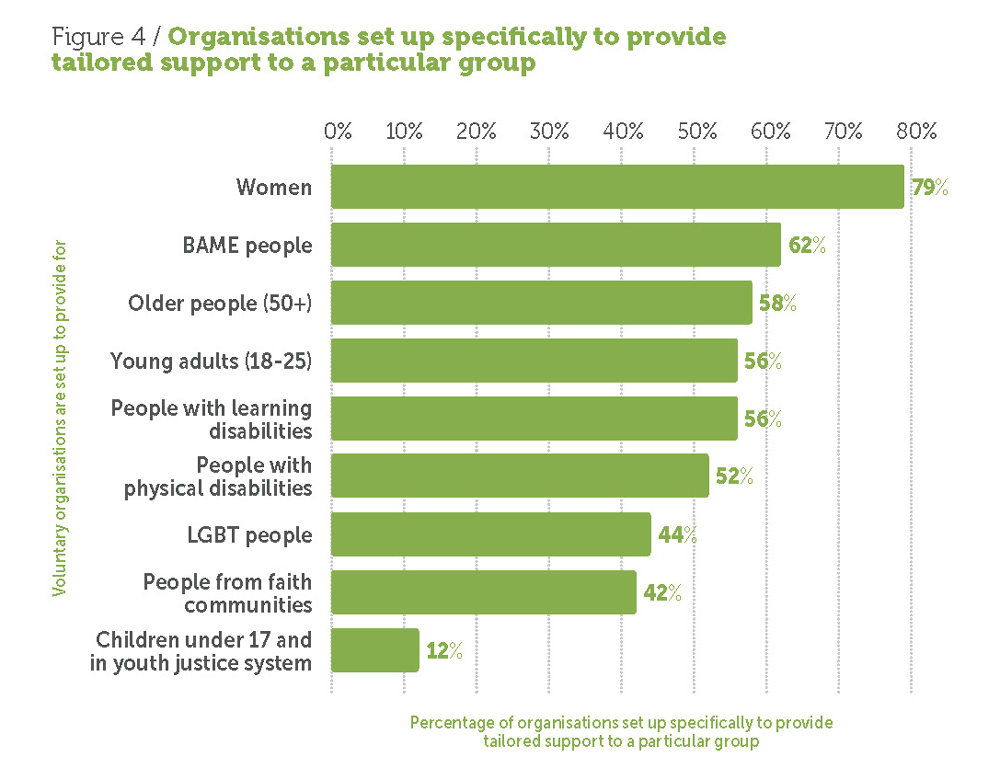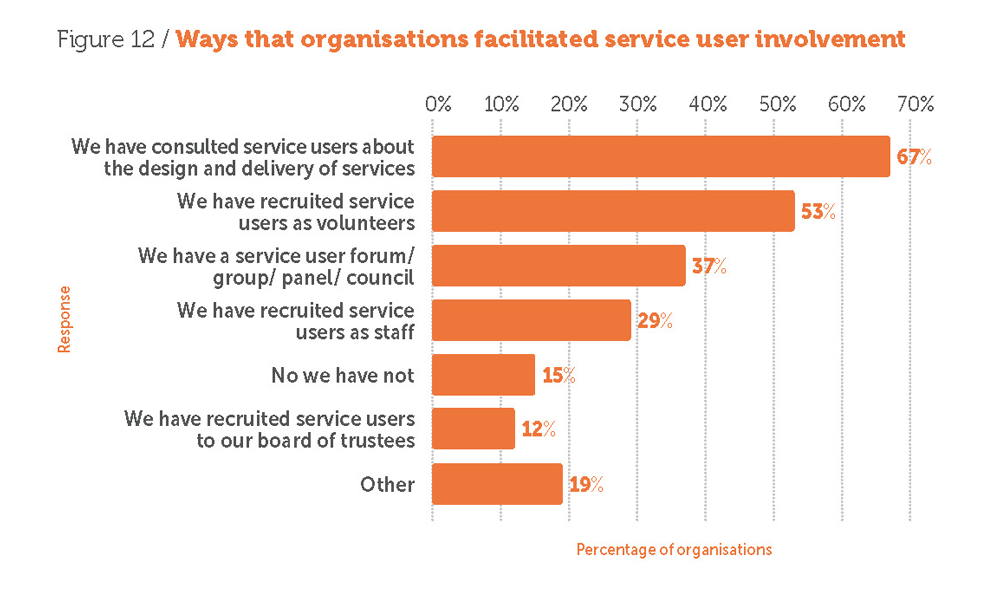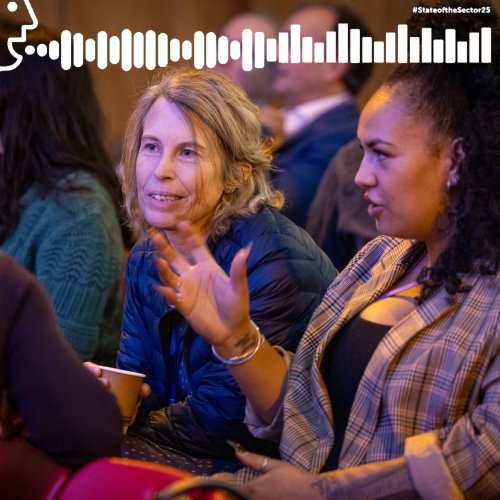Every year Clinks conducts important research on the state of the voluntary sector working in criminal justice. Our research explores four key areas - service users; service delivery; staff and volunteers; and funding – and uncovers a wealth of evidence about this unique and diverse sector.
The report we produce is a vital source of evidence that we use to represent and advocate for the sector with key decision makers. To help our members digest the key findings we’ll be doing a blog series that focuses on each of the four areas of the report.
This first blog takes a closer look at the people organisations support.
Responding to the intersectionality of service users
This year we asked organisations whether they provided tailored support specifically for a group with protected characteristics. Protected characteristics are those protected under the Equality Act 2010, for example race, religion and gender.
More than half indicated that they do. But the responses also provided us with an interesting opportunity to reflect on the intersectionality of identities.

Many of those organisations ticked that they provide tailored support for more than one group of people. Perhaps this shouldn’t be a surprise – after all how many people would put themselves into just one category? Just because an organisation is set up to deliver tailored support to a particular group – such as women – does not mean that their service users are not diverse.
That said, not excluding people with particular identities is not the same as providing tailored support to that particular group or community. We are concerned about the role of tailored organisations that are specifically set up for a particular group or community – and their specific experiences and challenges – being obscured amongst organisations with broader remits.
We consulted our members at the State of the sector launch event on how we gather this information to ensure that in the future we are representing tailored services as accurately as possible.
Facing multiple disadvantage and systemic challenges
Our findings also shine a light on the multiple disadvantages and range of challenges faced by the sector’s clients and by extension people in contact with the criminal justice system (CJS).
- Two thirds of organisations said they support people with substance misuse issues
- Over half said they support people who are homeless
- Almost half said they support people with a specific financial need, including poverty.
This makes it all the more concerning that for the third year in a row, organisations reported an increase in the number of people turning to their services. Organisations delivering tailored support to groups with protected characteristics were even more likely to report this. Combined with an increase in numbers, organisations also told us that the needs of people they support are becoming more complex and more urgent.
We found a number of systemic issues are forcing people into more vulnerable positions and leaving them at crisis point. Worsening conditions in prison are leading to an increase in violence and self-harm and seriously impacting the mental health of people in prison.
“More desperation, self-harm, pressure from violence and attacks, poor physical & mental health, and less safety [in prisons] …” - survey respondent
“More traumatised from their experiences within prison” - survey respondent
On top of this, timely resettlement support is also becoming increasingly challenging to access and people are being released into immediately desperate situations. Organisations told us that short custodial sentences were making this situation even worse because of the difficulties those sentences create in planning for release.
A severe lack of housing and welfare reform is leaving people unable to afford a basic standard of living and with nowhere safe and secure to live. Universal Credit, delays in payments, sanctions and the complexities of navigating the welfare system are having detrimental impacts.
“Increase in the number of people impoverished due to Universal Credit introduction.” - survey respondent
“So many of the people we work with will be homeless or in unsuitable accommodation …” - survey respondent
As this happens, and increasing numbers of people are being pushed into poverty, funding cuts have led to a serious reduction in the support provided by statutory services and have restricted access to what is still available. This means more people are turning to the voluntary sector to plug that gap in support.
“Impact of changes in local services and austerity and cut-backs mean that service users are presenting with more urgent and complex needs.” - survey respondent
The vital insights and expertise of service users
Our research shows people in contact with the CJS face many systemic challenges. The growing size and complexity of these and the role that the voluntary sector plays in addressing them (both through supporting people and by advocating for change) means it is becoming increasingly important that organisations involve service users and people with lived experience of the CJS in their work.
People who are or have been in contact with the CJS are experts by their experience and best placed to highlight the impact of policy and practice and drive change. There is growing recognition of the need for organisations to engage with service users to inform their work. This is to some degree reflected in the responses to our survey, where just over two thirds of organisations said they had consulted service users about the design and delivery of their services.
However, there is still a way to go for the sector in meaningfully involving service users in their organisations. Only 29% of organisations said they recruited service users as staff and only 12% said they recruited service users to their board of trustees.

Recent research by the Criminal Justice Alliance, Change from Within, highlights the necessity of hiring people with lived experience of the CJS in the criminal justice workforce and the benefit doing so can bring to organisations. As their report highlights, systemic challenges need fresh and innovative solutions and the valuable insights of people who have been affected by the CJS.
For our sector to truly offer a vision for change and involve people with lived experience of the CJS in strategic decision making, we all need to be taking proactive steps to improve recruitment of service users to paid staff and trustee positions.
Next time
Look out for the next blog in this series which will be looking more closely at the services that organisations are delivering. In the meantime, if you have any questions about the issues raised in this blog please contact Lauren Nickolls, Policy Officer, at lauren.nickolls@clinks.org.
What's new
Publications
Latest on X
The role is for a leader from an organisation focused on racially minoritised people, with expertise in service delivery, policy, advocacy, or related areas in criminal justice. Racial disparities are present at every CJS stage. This role ensures these voices are central in shaping policy to help address and eradicate them. Apply by Mon 18 Nov, 10am. More info: https://www.clinks.org/voluntary-community-sector/vacancies/15566 #CriminalJustice #RR3 #RacialEquity

